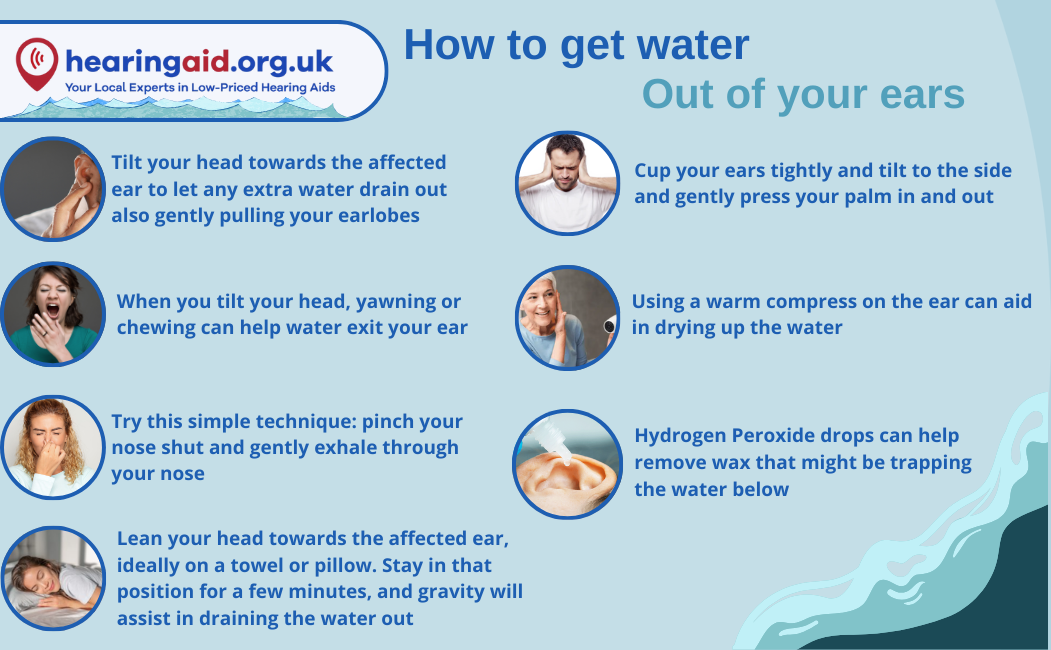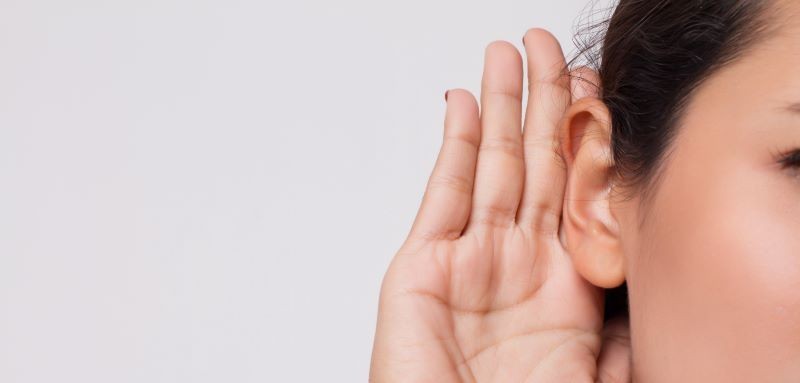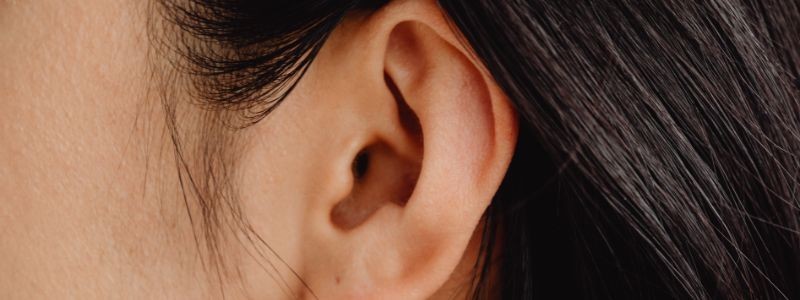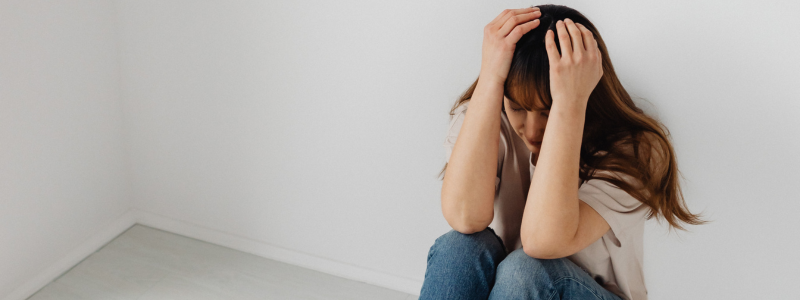
Head of Online Medical Content

Audiology Expert

Why do we get water in our ears?
How to get water out of your ears at home safely
Introduction | Symptoms | Causes | How to get rid of water in ears | What not to do | The dangers | Prevention | Treatment | Conclusion
Last Hearing Aid UK Update:
Water in the ears, why does it occur?
Water in the ears, often experienced after swimming or bathing, can cause discomfort, muffled hearing, and a feeling of fullness in the ear.
If water becomes trapped in the ear canal, it can lead to conditions like swimmer's ear (otitis externa), an infection caused by bacteria or fungi growing in the moist environment.
Common symptoms include itching, pain, and ear drainage. To prevent complications, it's important to remove water by tilting the head, using gravity, or trying ear drops.
Persistent water retention or infection may require medical attention to avoid hearing loss or long-term damage.
If you're reading this because you've been struggling with water in your ears for more than a few days, you're not alone - it's one of the most common ear problems we help people with, particularly during summer months and after holidays.
Water in the ear is common
Water in the ear is a common and often underestimated issue. It can also be more than just a temporary annoyance.
Whether it's from a refreshing swim, a shower or a sudden downpour, water trapped in the ear canal can lead to discomfort, temporary hearing impairment, and even potential complications if left unaddressed.
To eliminate excess water from your ears, consider employing techniques such as blow drying, using various types of ear drops, or even introducing a small amount of additional water.
Understanding how to deal with this common problem can help prevent unnecessary discomfort and protect your ears' health.
Whilst most cases resolve themselves within a day or two, it's worth knowing what to do - and equally importantly, what not to do - when water becomes trapped in your ear.
Blocked ear after swimming and water in the ear symptoms
Water in the ear, also known as swimmer's ear or otitis externa, is usually caused by swimming.
It is a common condition that occurs when water or other fluids become trapped in the ear canal. It can cause a range of symptoms, including earache, itching, and difficulty hearing.
Water in the ear is often accompanied by swelling and inflammation of the ear canal, which can make it difficult to remove the water.
Ear blocked after swimming?
It doesn't matter how old you are, swimming and playing in the water is a lot of fun; however, it can lead to water getting stuck in your ear. This can result in a fullness feeling in your ear canal and/or a feeling that you have water swishing around in your ear, similar to a trickle in your ear.
Water in the ears symptoms
These symptoms can be in both ears or just one ear. In addition to these symptoms, you may feel discomfort in your jawbone or throat, and your hearing might be muffled or distorted. Generally, tilting your head will help the water to come out of its own accord.
If you have water stuck in your ear for days, it can sometimes lead to an ear infection like otitis externa, also called swimmer's ear.
It's important to keep on top of your ear and hearing health, and if you have any concerns, you need to speak to your local GP. Alternatively, our audiologists can assess your ears and advise on the best course of action - sometimes without the weeks-long wait for a GP appointment.
Below, we talk about what causes trapped water in the ear, how to get water out of your ear, and how to prevent water in your ear.
Water stuck in the ear, how does it happen?
Why and how does water get stuck in your ear? Trapped water in the ear after swimming is due to various reasons, but the main causes are usually because something is inside your ear canal, like a build-up of earwax, or you have narrow ear canals.
More people are prone to waterlogged ears, and that includes anyone who spends a lot of time in the water, like surfers, for example. Getting water trapped in your ears can happen to anyone anytime you go underwater.
This is especially true if there is more pressure than usual, or you are inverting. Like doing a handstand under the water. Here's something that often surprises people: if you're prone to getting water stuck in your ears, it might actually be because you have quite effective earwax.
Whilst earwax is meant to be water-repellent and protective, sometimes it can create a sort of dam that prevents water from draining naturally. It's rather ironic - your ear's protection system can sometimes work a bit too well.
The shape and angle of your ear canal also play a role. Some people naturally have ear canals that don't drain as efficiently as others, which isn't a problem in itself, but it does mean you're more likely to experience that irritating sensation of trapped water after a swim.

How to get trapped water out of your ear
Guidance on how to remove water from the ear
How to get rid of water in the ear canal
Wondering how to remove water from the ear? If you are finding it difficult to get rid of the feeling of water in your ear, the most important thing to remember is not to insert anything inside your ear canal.
If you do, you might be at risk of pushing the obstruction or water deeper into your ear canal, puncturing your eardrum, injuring your ear canal, or even taking away the protective layer of earwax that stops bad bacteria from growing.
Try using these methods to get water out of your ear instead:
- Shake the water out of your ear: Tip your head to the side (both left and right) and tug your ear lobes gently at the same time.
- When water gets stuck in your eustachian tubes: Chew gum and move your jaw around as you tilt your ears toward the ground. The chewing motion helps open up the tubes that connect your ear to the back of your throat, which can release trapped water.
- Open closed Eustachian tubes to release the water stuck in your ears: Breathe in, pinch your nose, close your mouth, and inhale slowly to open your Eustachian tubes. This is called the Valsalva Manoeuvre.
You might recognise this as the same technique you'd use when your ears pop during a flight - it works on the same principle.
- Gravity can help the water drain from your ear: Go on the side of your body that the affected ear is on and rest your ear on a towel.
This is particularly effective if you do it whilst watching television or reading - giving it 10-15 minutes rather than 30 seconds makes all the difference.
- Heat can help release water from your middle ear: Lie down and put your ear on a warm face cloth. Or use the low setting on a hair dryer and gently dry your ears.
The warmth helps evaporate the water and can be quite soothing if your ear is feeling uncomfortable. Just make sure the hairdryer isn't too hot or too close - you're aiming for gentle warmth, not a blast furnace.
- Creating a vacuum may draw the water out: Put your hand over your ear as you tilt your head down towards the ground, and then create suction by slowly moving your hand back and forth.
It might look a bit silly, but it genuinely works. The suction can help draw the water out without you having to insert anything into your ear.
- Olive oil might help drain the water out of your ear: Warm olive oil, drop a few drops in the affected ear, lie on your side for ten or so minutes, sit up, and tilt your ears down to release the water.
Make sure the oil is only slightly warm - test it on your wrist first, as you would with a baby's bottle. Too hot and you could damage your ear canal.
- Try adding more water: While it may seem counterintuitive, this method can effectively facilitate the removal of water from your ear. Begin by lying on your side and gently introducing water into the affected ear using a clean dropper.
After waiting for approximately 5 seconds, carefully roll over with the affected ear facing downward. This manoeuvre should prompt the complete drainage of the water.
Think of it like using water to rinse out a glass - sometimes adding more liquid helps flush everything out. It sounds odd, but it's actually quite effective.
The important thing with all these methods is patience. If one doesn't work immediately, try another, or come back to the first method after a few hours. Your ear canal is quite clever at self-draining when given the opportunity.

What not to do regarding water in the ears
Consulting a healthcare professional is the safest option for the safe removal of water or earwax from your ear.
If home remedies prove ineffective, avoid the temptation to employ ear swabs, your finger, or any other objects for ear exploration. Such actions can worsen the situation by:
- Introducing bacteria into the ear.
- Pushing the water further inside the ear canal.
- This can cause potential injury to the ear canal.
- Risking puncture of the eardrum.
This is genuinely important: cotton buds are not your friend here. We see far too many people who've made matters worse by trying to "just quickly" dry out their ear with a cotton bud.
The ear canal is surprisingly delicate, and even gentle pressure can cause problems. If you're tempted to use a cotton bud, put it down and try one of the methods above instead.
Similarly, resist the urge to use your finger, a corner of a towel, or - and yes, we've seen this - a rolled-up tissue. Anything inserted into the ear canal risks pushing water deeper, introducing bacteria, or damaging the delicate skin lining your ear canal.

Water Trapped in the Ear
The dangers of not removing trapped water in the ears
What are the dangers of water in my ears?
In some cases, the water in your ears will come out on its own, as your earwax is water-repellent. However, if it doesn't, as we've mentioned already, bad bacteria can grow and cause infections like swimmers' ear.
Warm or wet conditions are the best environments for bacteria to grow. The symptoms of swimmer's ear may vary in severity, but they may include:
- Painful water in ears: Pain or an uncomfortable feeling in your ear.
- Itchy ears: An itchy feeling or a tickling feeling in one ear or both.
- Inflamed ears: Sore and red ears or ears that are tender to the touch.
- Leaking ears: Discharge from your ear or ears.
Symptoms of water in the ear can range from mild to severe and may include:
- Earache: Water in the ear can cause a sensation of pressure or pain in the ear.
- Itching: The ear canal may become itchy due to the presence of water or other fluids.
- Difficulty hearing: Water in the ear can cause temporary hearing loss or muffled hearing, as it blocks sound waves from reaching the eardrum.
- Drainage: Water in the ear may cause a clear, watery discharge from the ear.
Here's the thing about swimmer's ear: it starts off as a minor irritation but can escalate quite quickly if left untreated. The warm, moist environment created by trapped water is essentially a perfect breeding ground for bacteria.
What begins as a slight itch can progress to significant pain, discharge, and temporary hearing loss within just a day or two.
If you're experiencing pain rather than just discomfort, or if you notice any discharge from your ear, don't wait to see if it gets better. Swimmer's ear is much easier to treat in its early stages than when it's had time to develop into a full infection.
Now you know how to unblock water in your area, and can you prevent getting water in your ears?
Wondering how to prevent water in your ears while showering, bathing, or swimming? Wearing earplugs and/or a swimming cap while swimming can help prevent getting water in your ears; these can be found at your local pharmacy.
If you talk to your audiologist, they can recommend the best earplugs for swimming; some of them can be custom-fit to the shape of your ear canal and are often reusable and washable.
They can also advise you on other methods of how to prevent water from getting stuck in your ear in the future.
After swimming, always dry your ear properly to avoid any excess water getting into your ear, and using a hair dryer can evaporate any water inside your ear after swimming, bathing, or showering.
Prevention is genuinely worth the effort, particularly if you swim regularly or have narrow ear canals that are prone to trapping water. Custom-moulded swimming earplugs are a worthwhile investment for regular swimmers - they're comfortable, effective, and last for years.
Some practical UK-specific advice: if you're swimming in outdoor pools or open water (increasingly popular in the UK), you're dealing with potentially colder water temperatures and different bacterial environments compared to heated indoor pools.
The principles are the same, but the risk of problems developing is slightly higher, so prevention becomes even more important.
For children who spend their summer holidays in the pool, developing a routine of ear drying after swimming can prevent a lot of discomfort and potential infections. Make it as automatic as drying off with a towel - tilt the head, give the ears a gentle dry, and you're done.
Had water in the ears for days? How long can water stay in your ear?
Water can stay in your ear for days, even months, and can be an awkward and irritating sensation. If water stays trapped in your ear after 2 or 3 days or if you show signs of infection, you must contact your local GP.
If you avoid seeking medical attention, your symptoms can worsen and, over time, cause more long-term damage to your ears or even hearing loss.
Here's something worth knowing: if you've had a persistent feeling of water in your ear for several days, what you're experiencing might not actually be water anymore.
The sensation can linger even after the water has drained, or the original trapped water might have triggered inflammation that's causing the ongoing sensation of fullness.
This is where professional help becomes important. Our audiologists can examine your ear canal and eardrum to determine exactly what's happening. Sometimes it's simply a matter of removing a small plug of softened earwax that's been blocking drainage.
Other times, there might be early signs of infection that benefit from prompt treatment.
The good news is that with over 200 qualified audiologists across the UK, you don't need to wait weeks for an appointment. We offer free home visits if getting to a clinic is difficult, which can be particularly helpful if you're experiencing discomfort or balance issues.

Water in the Ear Feeling
Water in the ears treatment and other useful information
Water behind the eardrum
Fluid in the ear can develop when there is a problem with your ear's drainage tubes. This results in a build-up of fluid behind the eardrum. This can be caused by various reasons and can be a symptom of other ear problems and conditions.
So, what causes fluid in the eardrum? It can be caused by something preventing the tubes (or Eustachian tubes) from draining correctly, such as:
- Cold and flu, or other types of congestion.
- Throat or sinus infections.
- Allergies.
- A growth that blocks the tubes.
- Ear barotrauma.
This is slightly different from water trapped in your ear canal after swimming. Water behind the eardrum - in your middle ear - is typically related to infection, allergies, or Eustachian tube dysfunction rather than external water getting in.
The sensations can feel similar, but the causes and treatments are quite different.
How to treat water behind the eardrum
Fluid behind the eardrum can go away on its own or be treated by your local GP. If the blockage behind your eardrum is causing pain, infection, or inflammation, then you may be prescribed a course of antibiotics to help the fluid drain away and reduce the swelling and discomfort.
If this course of action is unsuccessful, then in some cases grommets (small tubes) can be placed into your ear to drain the fluid. Grommets are tiny tubes that are inserted through the eardrum to allow fluid to drain from the middle ear.
The procedure is straightforward and typically performed under local anaesthetic for adults or general anaesthetic for children. They usually fall out naturally after several months once they've done their job.
Sound of water in the ear
This is often due to trapped water in your ear, but if confirmed that it is not, it could be tinnitus. Tinnitus is a medical condition that can lead to ringing, whooshing, or swishing sounds in your ear or ears.
Due to the sound coming from inside your ear, people often say that it sounds like the sea. Tinnitus can affect you long or short term and can be caused by:
- A build-up of earwax.
- Perforated eardrum.
- Infection.
- Allergies.
- Growths inside the ear.
- Otosclerosis
If the tinnitus sounds persist, then you should seek medical help from your GP, or you may need to be referred to an audiologist for further treatment of tinnitus if there is no underlying health condition, such as an ear infection.
The frustrating thing about tinnitus is that it can genuinely sound like water sloshing around in your ear, even when there's no water present at all. If you've tried all the methods for removing water and the sensation persists beyond a few days, tinnitus becomes a more likely explanation.
The good news is that tinnitus, whilst annoying, is manageable. Modern hearing aids can actually help with tinnitus, and our audiologists are experienced in providing tinnitus management strategies.
Sometimes understanding what's causing the sound is half the battle in learning to cope with it.
Related reading: Hearing aids for tinnitus

Water trapped in the ear for days
When to see a doctor for professional help
I've tried everything to get water out of my ear- what should I do?
Usually, trapped water goes away on its own without treatment. If symptoms persist for longer than three days, the at-home treatments don't work, you're experiencing pain, or you think you might have an ear infection, contact your local GP.
Have you had a feeling of water in your ear for months? Ear infections can quickly become serious if not diagnosed and treated quickly, such as hearing loss, cartilage complications, or bone damage.
Your GP can prescribe the best course of treatment for your symptoms to relieve the pain and infection to the severity. Whilst GPs are absolutely the right choice for infections requiring antibiotics, audiologists can help with many ear-related issues, often more quickly.
We can examine your ears, remove problematic earwax, advise on ear care, and refer you to your GP if we identify anything that needs medical treatment.
Our consultations are free, and we offer appointments at times that actually suit you - including evenings and weekends. For many people, this means addressing their ear problem days or even weeks sooner than waiting for a GP appointment.
When to get help
Whilst we've covered numerous home remedies for trapped water, there are situations where professional help is the sensible next step:
- After 3-4 days of persistent sensation: If you've tried the methods above and still have that blocked feeling after a few days, it's worth having someone take a look.
The issue might not be water at all - it could be earwax that's been softened by the water and is now blocking your ear canal.
- Any sign of infection: If you're experiencing pain (not just discomfort), discharge, increasing redness, or your ear feels hot to the touch, these are signs that bacteria have taken hold. Early treatment prevents complications.
- Hearing changes: If your hearing has noticeably reduced in the affected ear, or if you're experiencing unusual sounds, an audiologist can determine whether this is temporary (due to the blockage) or requires further investigation.
- If you wear hearing aids: Water and hearing aids don't mix well. If you've got water in your ears and you normally wear hearing aids, it's worth having your ears checked before resuming use.
Trapped moisture can affect both the hearing aid's performance and your ear health.
Key takeaways
- Water trapped in the ear after swimming or bathing is common and usually resolves on its own, but if left untreated can lead to swimmer's ear (otitis externa), a painful infection with symptoms including fullness, muffled hearing, itching, pain, and discharge.
- Safe removal methods include tilting your head while tugging your earlobe, lying on your side to let gravity help, applying gentle heat with a warm cloth or hairdryer on a low setting, or creating a vacuum by cupping your hand over the ear.
- Never insert cotton swabs, fingers, or objects into your ear as this can push water deeper, introduce bacteria, or damage your eardrum.
- Prevent water in ears by wearing earplugs or a swimming cap when swimming, and always dry your ears thoroughly after water exposure.
- If water remains trapped for more than 2-3 days, you experience severe pain, or notice signs of infection, contact your GP promptly to avoid complications such as hearing loss or long-term ear damage.
Conclusion
If these methods do not work or if you are experiencing severe symptoms such as a severe earache or discharge from the ear, it is important to consult with a healthcare professional.
They can examine your ear and determine the best course of treatment, which may include ear drops or other medications to help remove the water and alleviate any symptoms.
It is also important to take steps to prevent water in the ear in the future. Wearing earplugs when swimming or showering can help prevent water from entering the ear canal, and avoiding the use of cotton swabs and other foreign objects in the ear can also help reduce the risk of water in the ear.
Why Choose Us?
- FREE Hearing Tests
- Best Hearing Aids and Prices
- FREE Aftercare for Life
- FREE Home Visits
- 200+ Local Audiologists
- 60 Day Money Back Guarantee
Can't get rid of water in your ears?
If you can't get water out of your ears, try tilting your head to the side, pull on your earlobe gently, and hop on one foot.
Try using a blow dryer on the lowest setting or try over-the-counter ear drops. If the problem persists, consult your local GP, as we are unable to help you with this.
If you think you might have hearing loss or your hearing has worsened and need some impartial advice, please call us free, at Hearing Aid UK on 0800 567 7621 to speak with one of our audiologists.
You can also watch the short video from Healthline about water in your ears or the NHS whitepaper on ear health below.
Other hearing loss awareness articles you might like...
 Hearing aid stigma
Hearing aid stigma  The impact of diet on your hearing
The impact of diet on your hearing  How to tell if hearing loss is permanent or temporary
How to tell if hearing loss is permanent or temporary Our specialist service includes:
Do not spend hundreds of pounds without getting a second opinion from us.
Please call us on 0800 567 7621
 Not only are the prices great, but the service is fantastic! Many thanks to your team.
Not only are the prices great, but the service is fantastic! Many thanks to your team.Watch the Healthline video on how to get rid of water in your ear below
What's included in our hearing aid prices?
Other pages you might find useful
Common FAQs about water in ears
Will water come out of my ear naturally?
Normally, gravity aids in the natural drainage of water from the ears. However, when this process seems ineffective, certain home remedies such as using eardrops and gently manipulating the earlobe may assist in facilitating the removal of trapped water.
Why can’t I get water out of my ear?
When water remains trapped in your ear, it's possible that earwax or debris is obstructing its exit. In such cases, refrain from inserting any objects into your ear, as this could lead to potential infections. Consider using sterile eardrops to gently soften the earwax.
If you suspect an ear infection, possibly swimmer's ear, it's advisable to seek medical attention for proper diagnosis and treatment by a healthcare professional.
What happens if you have water in your ear for too long?
When water lingers in your ear, there's an increased risk of developing an ear infection, particularly if the water carries bacteria. This condition, known as swimmer's ear, often necessitates medical intervention and treatment by a healthcare professional.
How do you open a blocked ear?
When your ear feels blocked, whether from water or pressure, you can often safely relieve the discomfort by inducing the opening of your eustachian tubes through actions like yawning, swallowing, or employing a warm compress. If these self-help measures prove ineffective, seeking assistance from a medical professional may be a prudent course of action.
Ask the Experts
6 Morton Lane
Walkwood
Redditch
Worcestershire
B97 5QA
Latest Launch
When we refer to a product as 'Latest Launch', we mean it is the latest to be released on the market.
New
When we refer to a product as 'New', we mean that the product is the newest hearing aid model on the market.
When we refer to a product as 'Superseded', we mean that there is a newer range available which replaces and improves on this product.
Older Model
When we refer to a product as an 'Older Model', we mean that it is has been superseded by at least two more recent hearing aid ranges.
